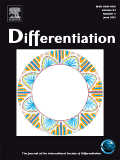
Cells & Development
Scope & Guideline
Bridging Basic and Applied Science in Development
Introduction
Aims and Scopes
- Cellular and Molecular Mechanisms in Development:
The journal emphasizes the study of cellular and molecular processes that underlie development, including signaling pathways, gene expression regulation, and cellular interactions. - Stem Cell Biology:
Research on stem cells, including their differentiation, regeneration, and role in development, is a significant focus, showcasing the potential of stem cells in therapeutic applications. - Tissue Morphogenesis and Organogenesis:
The exploration of how tissues and organs form, including the mechanical and biochemical cues that guide these processes, is a central theme in the journal. - Model Organisms in Developmental Biology:
The use of model organisms like zebrafish, Drosophila, and Xenopus to understand developmental processes is a key area, providing insights that are often translatable to human biology. - Innovative Imaging and Experimental Techniques:
The journal promotes the use of cutting-edge imaging technologies and experimental methodologies to investigate dynamic cellular processes in real-time.
Trending and Emerging
- Single-Cell Genomics and Transcriptomics:
There is a growing trend towards single-cell RNA sequencing and other genomics approaches, allowing researchers to dissect cellular heterogeneity and understand developmental trajectories at unprecedented resolution. - Mechanobiology and Cellular Mechanics:
Research exploring the physical forces and mechanical properties influencing cell behavior and tissue development is on the rise, reflecting an increasing appreciation for the role of mechanics in biology. - Epigenetics in Development:
Emerging studies on epigenetic regulation during development highlight the importance of epigenetic modifications in cell fate decisions and lineage specification. - Multiscale and Systems Biology Approaches:
The integration of mathematical modeling and systems biology to understand complex developmental processes at multiple scales is gaining traction, showcasing a move towards a more holistic understanding of development. - Applications of Advanced Imaging Techniques:
The use of advanced imaging techniques, such as live-cell imaging and 3D reconstruction, is trending, enabling researchers to visualize dynamic processes and interactions in real-time.
Declining or Waning
- Traditional Genetics in Developmental Studies:
While genetics remains important, there has been a noticeable decline in publications focused solely on classical genetic approaches, as newer techniques like CRISPR and single-cell sequencing gain traction. - Descriptive Studies without Mechanistic Insights:
Research that primarily describes developmental processes without delving into the underlying mechanisms is becoming less common, as the field shifts towards a more mechanistic understanding of development. - Studies on Non-Model Organisms:
There has been a marked decrease in studies focusing on non-model organisms, as researchers increasingly favor well-characterized model systems that offer more robust experimental frameworks.
Similar Journals

GENES TO CELLS
Fostering Innovation in Genetic and Cellular ResearchGENES TO CELLS is a distinguished peer-reviewed journal published by Wiley, offering valuable insights into the intricate world of cell biology and genetics. With an ISSN of 1356-9597 and an E-ISSN of 1365-2443, this journal has been contributing to the academic community since its inception in 1996 and will continue its publishing journey until 2024. Recognized with a category quartile ranking of Q3 in both Cell Biology and Genetics, and Q2 in Medicine (Miscellaneous) as of 2023, it serves as an important platform for disseminating innovative research and reviews in molecular biology and related fields. Although it does not currently offer open access, the journal caters to a diverse readership by providing comprehensive studies that are essential for professionals, researchers, and students aiming to deepen their understanding of genetic mechanisms and cellular functions. Situated in the United Kingdom, GENES TO CELLS continues to play a pivotal role in shaping the future of biological research.

Frontiers in Cell and Developmental Biology
Pioneering research for a deeper understanding of life.Frontiers in Cell and Developmental Biology is a leading open-access journal published by FRONTIERS MEDIA SA, dedicated to advancing the understanding of fundamental biological processes at the cellular and developmental levels. Since its inception in 2013, the journal has positioned itself as a cornerstone of research in its field, achieving esteemed Q1 quartile rankings in both Cell Biology and Developmental Biology for 2023. With a robust Scopus ranking of #13 out of 82 in Developmental Biology and #67 out of 285 in Cell Biology, it represents a vital platform for innovative research and scholarly discourse. The journal provides a comprehensive and accessible avenue for researchers, professionals, and students alike to share high-quality findings and insights into cellular mechanisms and developmental processes, fostering collaboration and knowledge exchange in the global scientific community. Based in Lausanne, Switzerland, Frontiers in Cell and Developmental Biology is committed to open science, ensuring that all articles are freely accessible to the public, thereby broadening the impact of research in the biological sciences.

STEM CELLS AND DEVELOPMENT
Unraveling the Mysteries of Development and RegenerationSTEM CELLS AND DEVELOPMENT, published by Mary Ann Liebert, Inc., is a leading peer-reviewed journal dedicated to the rapidly advancing fields of stem cell biology and developmental science. With an ISSN of 1547-3287 and an E-ISSN of 1557-8534, the journal encompasses a broad range of topics central to understanding stem cells' roles in development and regeneration processes. It holds a prestigious standing within its category quartiles, ranking Q3 in Cell Biology, Q2 in Developmental Biology, and Q2 in Hematology for 2023. With its convergence from 2004 to 2024, STEM CELLS AND DEVELOPMENT fosters an innovative platform for researchers, professionals, and students to disseminate groundbreaking research, share insights, and explore novel therapeutic approaches. Open access options enhance the journal's visibility and accessibility, promoting a collaborative exchange of information among the scientific community. Positioned at the forefront of stem cell research and its applications, this journal is vital for anyone seeking to stay informed about the latest advancements and trends within these critical areas of study.

TISSUE & CELL
Pioneering Research for a Healthier TomorrowTISSUE & CELL is a prominent academic journal, published by CHURCHILL LIVINGSTONE, that has been at the forefront of research in the fields of cell biology, developmental biology, and miscellaneous areas of medicine since its inception in 1969. With a strong focus on high-quality research, TISSUE & CELL has established itself within the academic community, holding a Q3 ranking in both Cell Biology and Developmental Biology, and a Q2 ranking in Medicine as of 2023. The journal aims to disseminate significant findings that contribute to the understanding of tissue structure and function, helping to bridge the gap between basic biological research and clinical applications. While it operates on a subscription basis and does not currently offer Open Access options, the journal remains a vital resource for researchers, professionals, and students interested in cutting-edge developments in the biological sciences. The journal's address is located in the scenic city of Edinburgh, further establishing its academic heritage in the United Kingdom.

Cell Reports
Fostering Collaboration for a Healthier TomorrowCell Reports is a prestigious open-access journal published by CELL PRESS that has firmly established itself as a leading voice in the fields of Biochemistry, Genetics, and Molecular Biology. Since its inception in 2012, the journal has provided an innovative platform for rapid dissemination of cutting-edge research, ensuring that high-quality findings are accessible to a global audience. With an impressive impact factor and ranking within the top 10% in its category, as reflected by its Q1 ranking in Scopus, Cell Reports serves a vital role in advancing scientific knowledge and fostering collaboration among researchers. The journal's commitment to the open-access model not only enhances visibility but also encourages the sharing of critical advancements in molecular biology. Situated in the Netherlands, its contributions are recognized worldwide, making Cell Reports an indispensable resource for scientists aiming to stay at the forefront of their fields and facilitate breakthroughs that may shape the future of biomedicine.

Russian Journal of Developmental Biology
Advancing knowledge in the evolution of life.The Russian Journal of Developmental Biology, published by PLEIADES PUBLISHING INC, serves as a significant platform for researchers and professionals engaged in the field of developmental biology. With the ISSN 1062-3604 and E-ISSN 1608-3326, this journal focused on intricate biological processes and dynamic developmental mechanisms from 2005 until 2017. Although its coverage is currently discontinued in Scopus, it remains notable for its contribution to understanding the pivotal roles of biochemistry and molecular genetics within the context of development. As a publication situated in the competitive quartiles of the field and boasting an influential Scopus rank of #77 out of #78, it has made a unique mark in developmental studies. Researchers and academics seeking to enhance their knowledge of historical advancements in the discipline will find the journal a valuable resource, even as it navigates the transition away from active publication.

DIFFERENTIATION
Illuminating the Pathways of Molecular ProcessesDIFFERENTIATION is a respected peer-reviewed journal published by Elsevier Science Ltd, dedicated to advancing knowledge in the fields of Cancer Research, Cell Biology, Developmental Biology, and Molecular Biology. With an established history since 1973, the journal continuously explores the intricacies of cellular and molecular processes that govern differentiation in biological systems, thus playing a pivotal role in shaping contemporary research directions. Currently indexed in the Q3 quartile across multiple relevant categories, it provides a crucial platform for researchers to disseminate their findings and engage with the scientific community. DIFFERENTIATION does not offer open access, but it remains a valuable resource for academics seeking to enhance their understanding of the fundamental mechanisms that underpin life sciences. By fostering a rigorous dialogue among scientists, it contributes significantly to the ever-evolving landscape of biochemistry and genetics.

FOLIA BIOLOGICA
Nurturing Scholarly Dialogue in Molecular BiologyFOLIA BIOLOGICA, published by Charles University Prague, First Faculty of Medicine, is an esteemed academic journal that has been contributing to the fields of Biochemistry, Cell Biology, Developmental Biology, Genetics, Immunology, and Molecular Biology since its inception in 1961. With an ISSN of 0015-5500, this journal serves as a vital platform for researchers and professionals to disseminate their findings and advance knowledge within these disciplines. Despite its current Category Quartiles ranking in the lower tiers (Q3 and Q4), FOLIA BIOLOGICA continues to provide valued insights and foster scholarly dialogue, particularly in its paralleled fields. The journal is headquartered in Prague, Czech Republic, and operates without Open Access options, which emphasizes its focus on curated, peer-reviewed content essential for academicians and students. By bridging theoretical and practical knowledge, FOLIA BIOLOGICA remains committed to enriching the scientific community and serving as a cornerstone for future research innovations.

Organogenesis
Pioneering Research in Embryology and Beyond.Organogenesis is a leading journal published by Taylor & Francis Inc, dedicated to advancing the field of developmental biology and regenerative medicine. With an ISSN of 1547-6278 and E-ISSN 1555-8592, this journal spans an extensive research scope that includes embryology, transplantation, and biomedical engineering, distinguishing itself as a crucial platform for researchers and practitioners alike. Its impact is reflected in its performance across various categories in 2023, earning Q3 rankings in Biomedical Engineering and Embryology, Q4 in Developmental Biology, and Q2 in Transplantation, showcasing its reputable standing among peer journals. Moreover, with Scopus rankings indicating strong positioning in the fields of medicine and biochemistry, Organogenesis is essential for those looking to publish or stay updated on pioneering research. The journal facilitates rigorous peer-review and offers a forum for disseminating innovative findings, making it an invaluable resource for academics, professionals, and students committed to understanding the complexities of organism development.

DEVELOPMENT GROWTH & DIFFERENTIATION
Exploring the Mechanisms of Life’s ComplexitiesDEVELOPMENT GROWTH & DIFFERENTIATION, published by Wiley, stands as a vital journal in the realms of Cell Biology, Developmental Biology, and Medicine. With an ISSN of 0012-1592 and E-ISSN of 1440-169X, this esteemed journal has been a key player in the scientific community since its inception in 1969, continuing to contribute significantly to the understanding of developmental processes and mechanisms underlying growth and differentiation. Ranked Q3 in Cell Biology and Developmental Biology, and Q2 in miscellaneous aspects of Medicine as of 2023, the journal provides a platform for high-quality research articles, reviews, and critical insights that foster academic discourse in these vital fields. Although currently not available as open access, the journal ensures the availability of essential research to its global readership, facilitating collaboration and innovation. Researchers, professionals, and students alike will find DEVELOPMENT GROWTH & DIFFERENTIATION to be an invaluable resource for advancing knowledge and driving forward the scientific inquiry into the intricacies of biological development.